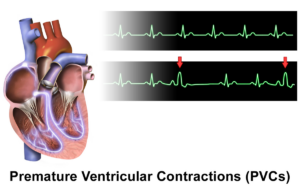
This is all about premature ventricular contractions (PVCs) as far as frequency and what REALLY matters as far as if they mean harm.
At my mother’s pacemaker evaluation, it was determined that over the preceding six months (the pacemaker keeps a record), she’d had five-thousand and something PVCs.
The pacemaker nurse told her this information with the same level as nonchalance as if she stated, “In the past six months I’ve seen a thousand patients.”
Is there a point, a cut-off value, after which the number of PVCs in one day should be of concern?
PVCs “recur throughout life; I think most people probably get them regardless of whether they are recognized,” says cardiologist David N. Smith, MD, a board certified cardiologist with Premier Cardiovascular Care and Wellness in SC.
“There is no specific cut-off. There are no specific numbers of PVCs that would alert someone to risk of danger.
“However, if PVCs were recurrent significantly or incessantly, particularly if they made one feel lightheaded or nearly passing out, a doctor’s advice should be sought. Medication may be suggested.”
Is there a correlation between number of PVCs per day (as confirmed with a monitor) and whether or not they mean something dangerous?
“The number PVCs do not implicate more or less danger or risk,” says Dr. Smith.
“However, incessant PVCs over years may lead to concerns about a weakening heart function. If the PVCs were ongoing for years and exercise tolerance is also bundling, consider a cardiology evaluation.”
Is the total per day or hour of premature ventricular contractions not relevant?
“The number PVCs per day is not, by themselves, risky,” says Dr. Smith. “The sensation of PVCs are the bigger concern.”
This so-called cardiac awareness can be troubling for many people, and it’s why they seek medical attention.
Cardiac awareness can be very distracting, not to mention frightening.
Treatment is designed to minimize this awareness or discomfort. However, says Dr. Smith, “This does not implicate a life threat.”
What’s meant by “frequent PVCs”?
“Having a PVC or 2/min is relatively infrequent or occasional. More than that we would consider frequent. If these occur, they typically can last days at a time.”
Premature ventricular contractions are NOT a risk factor for heart attack.
Reducing Heart Attack Risk
Lose Excess Body Fat

Freepic/lyashenko
Avoid Trans Fats

Watch Sodium Intake

Restrict Processed Foods

Shutterstock/Altagracia Art
Don’t Smoke

©Lorra Garrick
Control Blood Pressure

Freepik.com
Use a Treadmill Desk to Reduce Daily Sitting Time

Practice Good Sleep Habits

Freepik/gpointstudio
Do Intense Strength Training

Shutterstock/Monkey Business Images

Shutterstock/ Phase4Studios

Dr. Smith is a published author, national lecturer and Yale-trained physician-scientist certified by the American Board of Internal Medicine in Cardiovascular Disease. From his basic science background combined with advanced clinical research training at the Columbia Mailman School of Public Health, he brings an integrated holistic approach to cardiovascular medicine.
 Lorra Garrick has been covering medical, fitness and cybersecurity topics for many years, having written thousands of articles for print magazines and websites, including as a ghostwriter. She’s also a former ACE-certified personal trainer.
Lorra Garrick has been covering medical, fitness and cybersecurity topics for many years, having written thousands of articles for print magazines and websites, including as a ghostwriter. She’s also a former ACE-certified personal trainer.
.
Top image: BruceBlaus/CreativeCommons
Irregular Heartbeat vs. Twitching Muscle in Chest: Comparison
PVCs for Two Minutes Straight: Does this Mean Heart Problem?









































